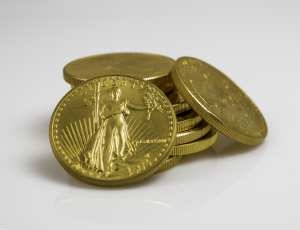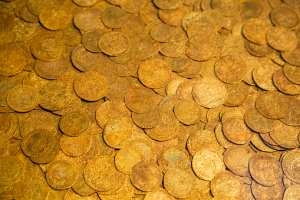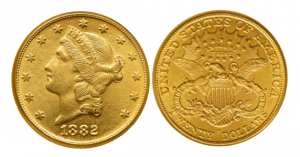

Among legendary coin collectors, the name of John Jay Pittman is quite possibly at the head of the hall- of-fame class. Outside of maybe the Smithsonian or the British Museum’s historical archives, his meticulously assembled collection of rare coinage was without numismatic peer in terms of sheer quality and depth.

In fact, his collection was of such importance and pedigree that it eclipsed even the most extraordinary modern day collections, including the Eliasberg, the Garret, and the legendary King Farouk collection. This fact is all the more remarkable if one considers that John Jay Pittman, unlike other name collectors, was a man of humble family origins and modest financial means.
However, he was a classic American example for everyone from all walks of life as to what one man with limited means can achieve with a determined vision and dogged perseverance.
Born in North Carolina in 1913 to a teacher mother and a railroad worker father, Pittman was 10 years old before he owned a new pair of shoes. By the tender age of 13, he was working full-time on a farm while attending school.
He gave up his early dreams of attending medical school, instead opting to earn a four year degree in chemical engineering, so that he could get a job and pay for the education of his brother and sister.
After graduation, he went to work for Kodak and indeed followed through on that promise by putting both his siblings through college. Pittman was both modest and unpretentious, working hard and saving nearly everything he earned. With his savings, he began collecting coins as a hobby that would turn out to be a lifelong passion and central investment of his life.

In fact, Pittman’s passion for collection coins was completely enthralling and supported by his wife that, in 1954, they mortgaged their home to finance a trip to Egypt where Pittman made some of his most important acquisitions at the auction of King Farouk’s Palace Collection. That decision changed collecting history.
As a collector of coins from all over the world, Pittman was a thorough and meticulous researcher. Early on, he adopted the strategy of trading his way up the ladder, so to speak. His vast knowledge and grasp of his subject led him to focus on collecting proof coins long before they were really popular among collectors in general.
From his knowledge of his subject, Pittman knew the long-term importance of the rarity of proof coin total mintages. Such coins were not in great demand when he began collecting them. He also understood that on a per-coin basis, proof coins did not cost a lot money compared to the more populous coins minted for general circulation.

His strategy paid off in the long run as Pittman wound up purchasing coins of great rarity for not much more than face value. In today’s terms, many of these same coins would sell for $20,000 and $30,000 each or even more.
Throughout his life, Pittman made astute purchases and many advantageous trades that vaulted him up the ladder in numismatic prestige. In one such transaction, Pittman traded 20 proof sets he had purchased in 1970 for $13 each in exchange for one single coin: a Bechtler $5 Carolina Gold Rutherford, which later brought $14,300 at auction.
In Pittman’s thoroughly devoted passion to coins, he even tended towards the whimsical at times. After his death, his daughter Polly remembers going through his things and finding a small envelope. Inside was a small copper coin inside a cellophane packet. Attached to the packet was a note from Pittman that read: “1953 Belgian One Centime piece, Wheaties Box.”
It seems that in the early 50s, as a marketing ploy, General Mills put small foreign coins in cellophane packets as a prize in Wheaties boxes. Polly remembers eating Wheaties when she was a child, because Pittman wanted his kids to get the coins in hopes they too would become interested in collecting.

By the time he died, Pittman had assembled a collection so vast that when they divided it into lots for auction, their number totaled more than 12,000. Each coin in the collection had been personally researched, located, and acquired by Pittman himself, piece-by-piece, and set-by-set.
The auction drew world-famous dealers, collectors, and investors from around the world. One of the highest bids at the auction was for the rare 1833 Half Eagle gold piece that Pittman had mortgaged his home to buy from the King Farouk collection. Pittman had paid $635 for the coin and it sold for $467,500. When he bought it originally, he paid a price that many thought was insane, since it was 20 times the price of the gold content of the coin.
While these were among the more impressive returns in the collection, it should be noted that Pittman gave little thought to the return on investment that he could one day get. In fact, Pittman rarely, if ever, purchased a coin while focusing on how much it might be worth someday.

For John Jay Pittman, it was the history, beauty, rarity, and even the story behind the coin that most intrigued his numismatic passions. Pittman was in love with coin collecting because he was in love with history first. To him, each coin was a history lesson unto itself, and among collectors, Pittman had few if any rivals who knew as much about history as he did, and this was his secret weapon.
The sale of Pittman’s collection raised more than $14 million and was divided among a multitude of collectors and dealers. One successful bidder remarked that Pittman’s collecting practices reminded him of the importance of four fundamentals: have a macro strategy, buy only quality coins, upgrade every chance you get, and build a relationship with a reputable dealer.
By focusing on the fundamentals, John Jay Pittman assembled a collection of esteemed pedigree, which was without equal.
Posting in: